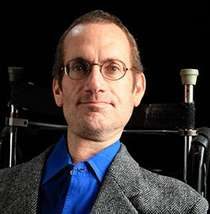
Trevor Noah (AP Photo, File)
When the popular comedian and TV host Trevor Noah recently announced that he’s leaving “The Daily Show” after seven years, perhaps no group was more disappointed than the disability community.
Noah might not have realized he’s a kind of hero to many of us. Perhaps not all disabled folks would agree, but to me, he’s done more for those whose bodies and minds function in ways that society deems shameful, who’ve struggled to feel comfortable in their own skin, than almost any other entertainer today.
Consider this: Back in March 2020, under Noah’s stewardship, “The Daily Show” featured Judy Heumann, often called the mother of disability rights, to promote her memoir Being Heumann and the documentary film Crip Camp. She didn’t appear in a tight head-and-shoulders shot either, as other live shows have done to hide a wheelchair user’s disability; she was shown on-screen in all her post-polio glory, photographed like any other guest.
Then, this past August, blind YouTuber Molly Burke was Noah’s guest for no particular reason other than to explain the many prejudices and access obstacles she routinely faces. To get a sense of his genuine commitment to greater understanding of disability, watch this funny and engaging segment. It illustrates exactly what I’m talking about.
More recently, when certain people “on the right” suggested that John Fetterman, a Democratic candidate for the U.S. Senate from Pennsylvania, was unfit to hold office because of his post-stroke language-processing disability, Noah said that was “trash, especially since America already has disabled lawmakers serving right now. It shouldn’t be a disqualifier.”
He’s proved himself happy to give time on-camera to those deemed different, to amplify the voices of the oppressed and outcast alongside the shiny and famous.
I think the reason that Noah seems to identify with disabled folks—and perhaps vice- versa—is that he, too, was born into a society where discrimination against people like him was completely legal as recently as the early 1990s. In fact, South African apartheid officially ended at about the same time the Americans With Disabilities Act of 1990 (ADA) went into effect.
“Born A Crime”
In his best-selling book Born A Crime, Noah, now 38, describes his boyhood under apartheid and how his life—and, more importantly, his expectations for his life—changed afterward. I am a 60-year-old disabled American, born with a genetic neuromuscular weakness called spinal muscular atrophy. I grew up years before disabled kids like me were allowed in regular schools, let alone into stores, restaurants, and movie theaters. It’s sort of a similar trajectory.
Like Noah’s mother, my parents told me I could grow up to be and do anything I wanted. It wasn’t quite true, though the subsequent Education for All Handicapped Children Act of 1975 (later renewed as the Individuals with Disabilities Education Act) and, later, the ADA brought that dream closer to reality.
Noah, I believe, understands how you can be grateful for gaining your rights, but also angry because you should’ve had those rights all along, just by virtue of being a living human being! Moreover, though the government says you’re now legally protected against prejudice and entitled to all society has to offer, you can’t help feeling that promise is not yet fully realized.
You Wouldn’t Believe the New York Subway!
“Trevor,” I’d say, if I were ever lucky enough to be on his program, “you wouldn’t believe what I went through to get here! The New York subway is about the most inaccessible and unaccommodating place left in America, second only to airplanes!”
He would get my drift. Noah knows what it’s like to be unjustly locked out of society and told you don’t belong.
To be sure, there are other enlightened talk show hosts. But Noah clearly leans in to people who speak up, who assert their right to equal justice and fair representation. I can only hope that his successor will see the beauty in this vision of diversity—one that includes all body types and ways of functioning.
The need for this acceptance, this endorsement, is palpable. Disabled people are done with hiding, minimizing, or apologizing for our differences, limitations, and necessities. We want and deserve to be seen, which is something that Trevor Noah seems to understand.

Ben Mattlin
Ben Mattlin is a Los Angeles-based freelance writer, author and frequent blogger for FacingDisability.com. He was born with spinal muscular atrophy, a congenital muscle weakness that causes paralysis and related health issues.
Ben is the author of MIRACLE BOY GROWS UP: How the Disability Rights Revolution Saved My Sanity, and IN SICKNESS AND IN HEALTH: Love, Disability, and a Quest to Understand the Perils and Pleasures of Interabled Romance . He is a frequent contributor to the Washington Post, New York Times and Financial Advisor magazine. His work has also appeared in the Los Angeles Times, Chicago Tribune, and USA Today, and has been broadcast on NPR’s Morning Edition.
Leave a Reply